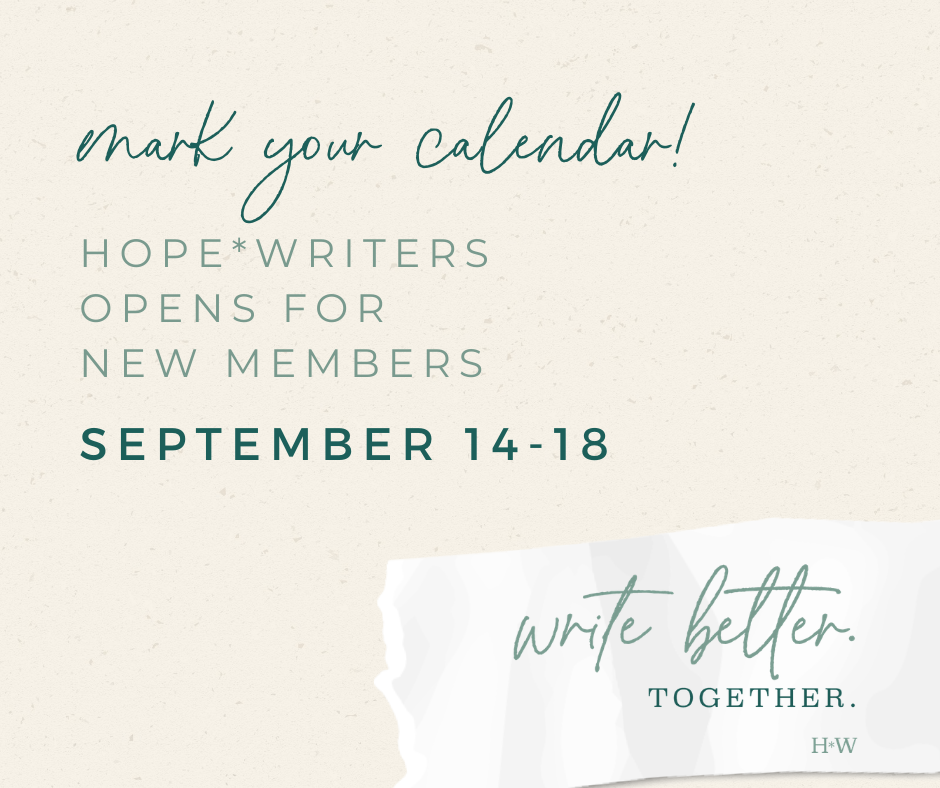079 - Why I Have a Business Journal
Affiliate links have been used in this post! I do receive a commission when you choose to purchase through these links, and that helps me keep this podcast up and running—I truly appreciate when you choose to use them!
Resources from this episode:
Show Notes:
Today's episode is short and sweet, and I am talking about why I have a business journal—a work journal.
Yes, a separate journal, completely dedicated to my work. And I'll be telling you why I think you should have one too.
For the full episode, hit play above or read through it below!
Before I jump into this episode, I wanted to briefly share about a resource that I have been a part of for the last several months that has been so helpful to me. It's called Hope*Writers, and it's an online community of writers, surprise, surprise.
They only open for enrollment twice a year, meaning you only have the ability to join Hope*Writers two times a year. And one of those times is fast approaching: registration opens September 14th and ends September 18th, where you'll have the ability to join that community full of resources and other writers.
Now, if this doesn't apply to you, you can just skip it, totally understand. But if you love to write or you feel like maybe one day, you'd like to write a book or you'd like to improve your blog or whatever, fill in the blank. If you just want more info, just to see if this is a good fit, you can learn more about it here.
Okay, here's what you need to know about me. I am a journaler. Like dorky, nerdy, geeky, journaler. I have been writing in my journals since I was 11 years old. I process things when I write. I love the feeling of an actual pen hitting actual paper. That's why I feel like journaling is different than blogging. While you're still writing for both, journaling, I believe is so healthy and helpful, because it's really just for you. It's for your heart and your eyes. It's not for anyone else's eyes to read or see.
Now I go into how to journal and why I journal in Episode 045. I even tell you what I write down in my personal journal every day and why it's so powerful for me. But today is not about that.
Today's not about my personal journal.
This is my business journal.
And I'm going to share with you the three main reasons I have a business journal and why I think you should too.
The first reason is that my work has always been my ministry.
Whether it was my photography business or this podcast or blogging or my housework, doing the dishes or folding laundry or raising babies, whatever it is, it's ministry.
I Googled ministry to better explain this to you and it really didn't help because I didn't like the definition. It said the worker vocation of a minister or religion. And I get that definition. But my definition of work as ministry is so much more than that.
But then I started thinking about the definition, I was like, well, I guess that's what I mean, because it's viewing yourself as a minister in every way and form and fashion of life. It's you are taking the gospel and the love of God into whatever your hand finds to do. The bottom line really is my work is the Lord's. It's all his, from start to finish. And I view my work is having a much greater purpose than doing a job and making money.
Side note, but my husband works with an organization called C12, and they, this is what he does. It's so cool. It's amazing how we both so strongly believe in this, and this is his actual work. But C12 is a business that helps other businessmen and women grow great businesses for a greater purpose, meaning they do their work as ministry. And they have huge businesses, like really big, multimillion dollar businesses my husband works with. I have a teensy weensy, little mama business, but the great thing about the kingdom of God is the size doesn't matter. God's kingdom is everywhere and work as ministry is beautiful because we can take that on ourselves and live that out in our work, in our homes, in our lives, whatever season you're in, whatever your hand finds to do, your work can be your ministry.
So my work, whatever it is, in the season of life I'm in is meant to further the kingdom of God. To demonstrate and show his indescribable love. For my work to be excellent in every way for it, to be honest and true, and my hope is that it always draws people to a relationship with the Lord, whether that's for the first time or just deeper into a walk with him than they had before.
Now in the private pages of my personal journal, I pour out my heart to God. I listen to him. I learn about him. I write down what I learn. I write down the words that he's saying to me. In the private pages of my business journal, I pour out my heart to God about my work specifically. I listen to him about my work. I learn from him about my work. God is brilliantly wise and he always has answers. And I learn more about him through my work. Ephesians 2:10 says, "For we are God's handiwork, created in Christ Jesus to do good works."
So in my mind, my work and the Lord and my relationship with him are inseparable, and my business journal is just a place to hold all that the Lord is teaching me and telling me about that. It's just a place to listen to him about the things I'm doing and write down the things that I hear.
The second reason I have a business journal is it's really convenient.
This is a very practical reason, but whenever I go to a conference or buy a course or attend a workshop, the notes that I take and the big ideas that I take away from those experiences, it all goes to my business journal. It all goes down in my notes, all of it, right in the business journal. It's all in the same place. The times in your life where you invest in learning from others who are a little bit ahead of you is so important. Many of my big business decisions have come from the times that I've set aside in my life to think, and to learn, and to listen from others, just to set aside that white space so that I can grow as the leader of my own work.
And before having a business journal, I would have these scattered notes everywhere. Usually, maybe in my personal journal, maybe in little notebooks provided by that certain conference or workshop, or a PDF that I printed off. But I tell you what, I would lose them, or I would file them in one place and then stick another in a drawer, they'd be in different places. And I just never knew how to access all of them in one spot. So this is a great way to consolidate the bigger ideas or concepts or plans that you have, that come out of those conferences and those times that you set aside to grow, and you always know where to find them or flip back to them as a resource, if you need to down the road.
Now, third and finally, it is a great place to write down your plans, your strategic plans for your business, high level thinking, the big things you want to knock out and accomplish.
Every time I do an annual planning day or a quarterly planning meeting, I bring my business journal. I bring my work journal. I write it down. I write down the rocks or goals that we create. It is a way to have a tangible way to track progress and change and growth.
Now I'm not saying I write in my business journal every day, I don't. I randomly pick it up as inspiration hits or every few weeks, or when I go to these conferences or learn from people. That's when I pick it up. It's not the day to day. This is like the quarter to quarter strategic planning or the conferences, the big picture goals and growth. And I just think it's so important to track that. So you can look back at it and celebrate it.
Now, I usually work on the same business journal for five to seven years before it fills up. So, I mean, it's like a slow thing, but the cool thing about this journal is it's the really big stuff. It's the turning points for me. It's the quarterly planning, it happens four times a year, well, three times a year plus an annual planning, which includes the other fourth quarterly planning. It's the big stuff. It's the bird's eye view. So it takes longer to fill up than my normal personal journal that I write in every single day.
But I think sometimes as business owners we can get so caught up in the busy-ness of business, the work of work that we forget to pause and look back and see how far we've come. And that is so important, to look back and celebrate your milestones. And the current business journal that I have, that I'm still writing in and still filling out. I can flip back and read prayers that I've written down and scripture that I've written down and goals that I've written down that had to do with Nancy Ray Photography four years ago, and then navigating all the way through the closure of that business and seeing God plant new dreams for this podcast and different ideas that I've had for education even before NRP closed and seeing it come to fruition.
And as I look back on it, I see God's faithful hand in the times of straight up darkness and confusion. I was so confused for a little while, so confused. But now that I have this business journal, I can look back and say, "God, I know what you were doing. And I see how, even though I didn't have an answer then, you gave an answer here." And it's just a really cool way, I think, to simply invite God into your work, into your heart, into your mind and into your work, because what we shouldn't do as believers is have a personal walk with the Lord and then set that aside when we go to work.
In fact, at Work & Play, I believe in living an integrated life, which means your faith affects every single part of your life, your family, your work, your play, your mental health, your wellbeing, your physical body, every part of you. You're one whole person, your whole, I mean, you were created wholly as a person and integrating your faith into your work is incredibly important.
And I have found that having a business journal is a wonderful tool in which you can actually do that and see God's hand in your business. So I hope if you don't have a business journal, I hope that you'll find one.
My encouragement to you is to get something nice, to get something that might be a leather bound journal or have nice pages, whatever your preference is, but go Barnes & Noble or find something on Amazon, pick it out, make it your own, get your favorite pen and just start writing the dreams that God has put in your heart and allow him to speak to you about your work and see what happens.
Work and Play cornerstore
All right, it's time for the work and play corner store, where I share a book I'm loving and a thing I'm loving. I'll get a small commission from anything bought through these links, which will help me continue to bring this podcast to you. So I always appreciate when you head to nancyray.com/cornerstore, but the price is normal for you, which is a win-win.
So today I'm going to be adding the book 2 Second Lean to the Cornerstore, and I'm going to be adding it on Amazon, but I want to give full disclosure, the author, Paul Akers, is amazing. He actually provides this book for free on his website. So I'll have it listed as a link in my Amazon store, but go to his website, you can download the entire audio file for free, which is amazing. It's one of my favorite business books. It's amazing.
I'm going to do a podcast episode about lean work and lean businesses because it's so fascinating, but I'll just highlight it really quickly here for you:
It's about eliminating any kind of waste in your business, any kind of disorganization or waste. It's about continuous improvement by approaching everything with an eye towards making things simpler and better. So I think there's seven different kinds of waste that he identifies, that you can eliminate in your business. You basically find out the things that bug you and you just eliminate them. And then you really make your culture change in your business. And it requires a permanent change by changing your habits. So he shares these small habits you can do every morning and throughout your day at work.
It's mind blowing. It honestly has infiltrated my mind so much that I think of how I can make my house more lean. I think of how I can make my closet lean. I think about, I can make my kitchen lean. It's really incredible. So I think that I might have to recycle that and bring that back for the book club or at least do a podcast episode on it coming up next year. But for now you should just go read it. It's pretty amazing.
Okay, so that was the book I'm loving. The next thing that I'm loving is this Hope*Writers community that I was telling you about in the beginning of this episode.
So I'll be honest, I really hesitate to spend money on things. I would not identify myself as a course junkie, and I'm not part of any memberships online other than this one. I've been watching Hope*Writers for years, and my friend, Emily P. Freeman, who is the host of The Next Right Thing podcast—great podcast—she founded this with her dad and a friend, and it's an incredible resource and I ended up joining a few months ago.
I have been a part of it, and I have found such encouragement. I have found writers of every single level, brand new, hopeful writers to the seasoned, hey, I've published 25 books kind of writers and everyone in between. And Hope*Writers says that they balance the art of writing and the business of publishing without feeling lost or discouraged or overwhelmed.
And I don't know what my future holds with writing. All I knew was that I wanted to get better at my writing, my content, making my delivery. And it has already helped me so much. I mean, even within there, I have learned from amazing women like Sally Clarkson and Beth Moore, all these, it's like a library that you just get access to immediately. It's pretty incredible.
And then also a community online that's very engaging and helpful. I'm not going to go on anymore because I want you to just read about it yourself, but you can click the button below to learn more.
I'll also link to a fun quiz that you can take, because who doesn't love fun quizzes. But I did this when I was considering it. And basically it'll place you in one of the six different writer stages, so you can figure out which level you're at, so that when you join Hope*Writers, you'll know where to begin. It's fascinating. It's great. It's a very thorough resource, highly recommended.
I'm going to close with words from Henry David Thoreau, who said,
"It's not enough to be busy. So are the ants. The question is, what are we busy about?"
That's what my business journal does for me. It helps me stop. It helps me assess where I am, why I'm so busy, what am I busy about? Where am I going? Helps me get fresh ideas and to strategize for what's to come.
I hope you get a business journal and I hope you love it.
Thanks for listening, and I'll see you next time.







